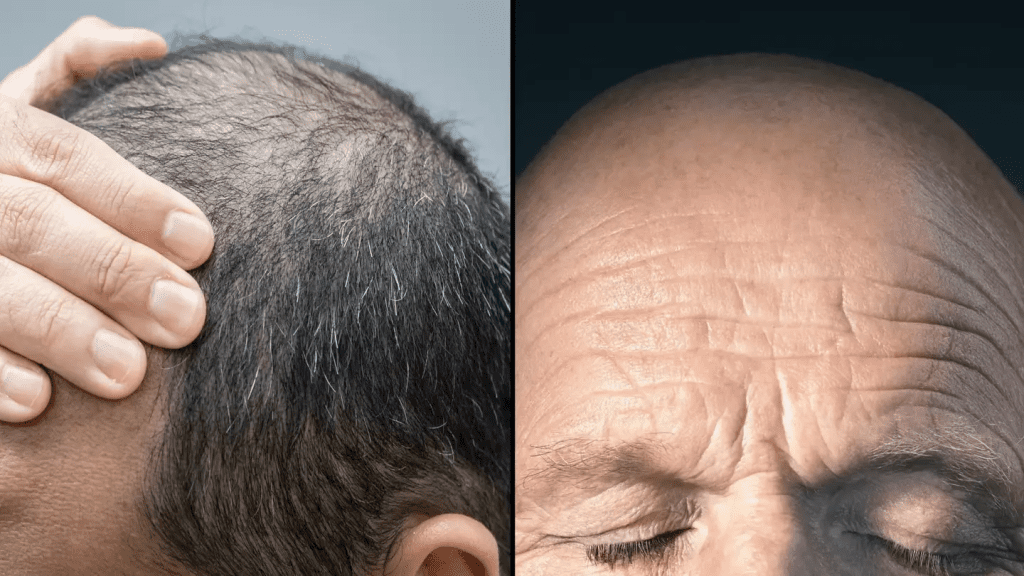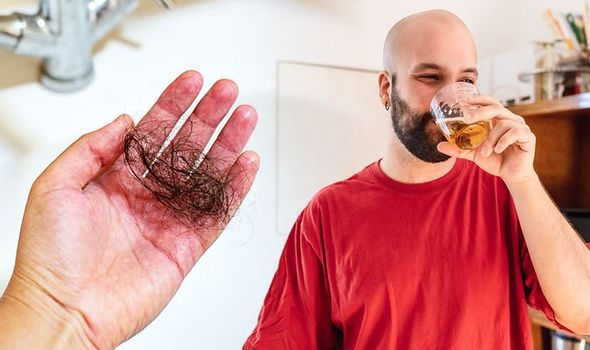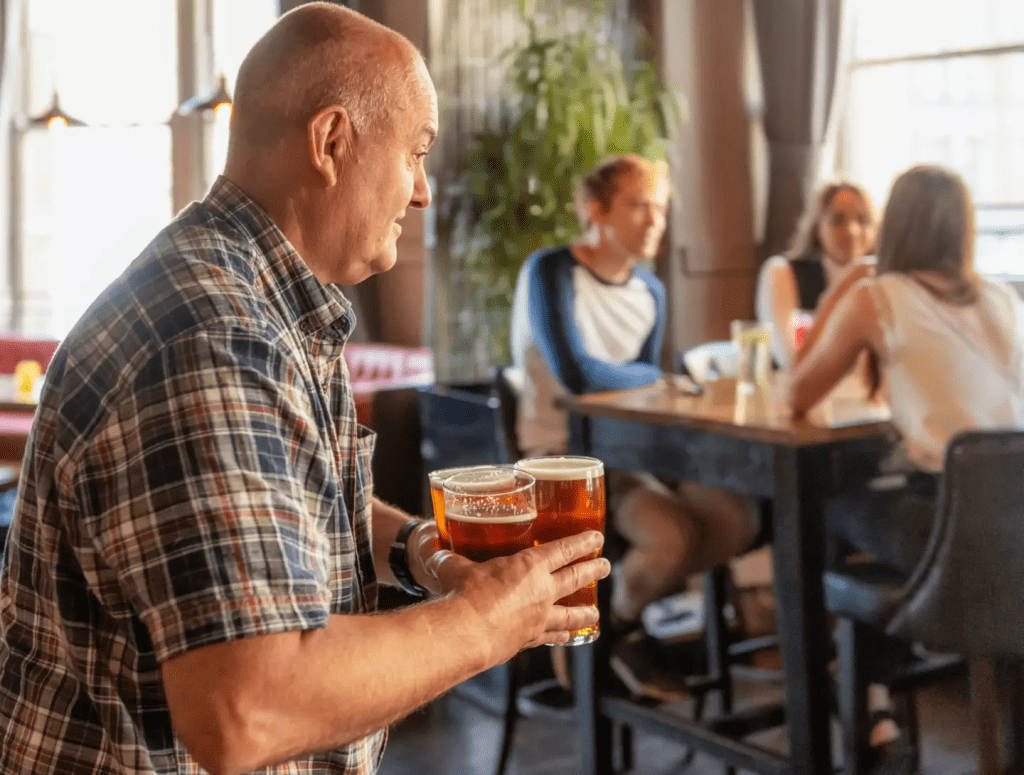Lush, thick hair can be one of the most defining features of a person’s appearance. So, when you find yourself running your hands through your hair and discovering an unsettling thinning or bald patch, it can feel like a devastating blow. While age and genetics are common causes of hair loss, experts have recently revealed that another factor could be quietly contributing to your hair woes—your lifestyle. Specifically, excessive alcohol consumption may be a hidden culprit behind why your hair is thinning or falling out.
Is Drinking Alcohol Causing Your Hair Loss?

It’s easy to brush off hair loss as something inevitable with age, but recent research suggests that your social habits—specifically drinking alcohol—could be accelerating the process. While it’s widely known that genetics and hormones play a significant role in hair thinning and androgenetic alopecia (AGA), studies are now showing that your lifestyle choices, like how much you drink, could be influencing hair health too. In fact, a study by Pusan National University has found that people who regularly consume alcohol are more likely to experience AGA than non-drinkers.
But just how strong is this connection between alcohol consumption and hair loss?
The Connection Between Alcohol and Androgenetic Alopecia (AGA)
Alopecia is a medical term that refers to hair loss, and it can occur for several reasons, including genetics, hormonal imbalances, or even stress. The NHS reassures that alopecia isn’t usually something to be overly concerned about, but it’s still something many people try to avoid, especially when it affects their appearance.
According to the findings from Pusan National University, individuals who regularly consume alcohol were found to be 1.4 times more likely to suffer from AGA compared to non-drinkers. This isn’t just a coincidence—it appears there’s a direct link between alcohol intake and the onset of hair loss.
The research, led by Professor Yun Hak Kim, explored how alcohol consumption may contribute to hair thinning. While the precise mechanism remains unclear, experts believe alcohol might affect the scalp’s immune environment, creating factors that may contribute to AGA.
How Does Alcohol Contribute to Hair Loss?
While the study doesn’t provide a definitive answer, one hypothesis is that alcohol’s metabolism produces a substance called acetaldehyde. This byproduct could interfere with the scalp’s immune system and disrupt the normal function of hair follicles, leading to hair loss. While this proposed mechanism remains speculative, it highlights the complexity of how lifestyle factors can impact health in ways we don’t always realize.
However, it’s not just alcohol consumption that could be a problem. Overuse of alcohol can lead to nutritional deficiencies, dehydration, and liver damage, all of which can have adverse effects on your hair health. When your body is deprived of key nutrients like zinc, iron, and biotin—important for healthy hair growth—it may result in thinning or shedding hair.
How Much Alcohol is Too Much for Your Hair?
We know that moderate drinking might not directly lead to hair loss, but what about those nights when you indulge in one too many cocktails? According to experts, it’s the regular and excessive drinking that poses the biggest risk to your hair.

If you’re consuming alcohol frequently or in large quantities, it’s a good idea to evaluate the impact it might be having on your overall health, including your hair. While it’s important to acknowledge the other contributing factors like genetics and stress, alcohol may be playing a more significant role than you think.
To maintain a healthy scalp and hair growth, it’s crucial to limit alcohol consumption. Moderation is key, and a balanced lifestyle—including good nutrition, proper hydration, and stress management—can go a long way in preventing further hair loss.
What Can You Do to Prevent Alcohol-Related Hair Loss?
If you’ve noticed that your hair is thinning or falling out more frequently, it might be time to take a closer look at your alcohol consumption. Here are a few practical steps you can take to help prevent alcohol-related hair loss:
1. Cut Back on Alcohol Consumption
While it may seem difficult, reducing the amount of alcohol you consume on a regular basis could help minimize hair loss. Aim for moderation—limit yourself to a couple of drinks per week rather than several per day.
2. Focus on Nutrition and Hydration
Ensure your body is getting the essential nutrients it needs to maintain healthy hair. A well-balanced diet rich in vitamins, minerals, and proteins will support hair growth. Drink plenty of water to stay hydrated, as dehydration can also contribute to hair thinning.

3. Manage Stress
Stress is another contributing factor to hair loss, and alcohol can exacerbate its effects. Practice relaxation techniques like yoga, meditation, or deep breathing exercises to manage stress levels and improve overall well-being.
4. Consult a Dermatologist
If you’re experiencing significant hair loss, it may be time to consult with a dermatologist. A professional can help determine the underlying causes of your hair thinning and recommend treatment options that are right for you.
Could This Research Lead to Better Hair Loss Treatments?
The findings from this study are only the beginning of what could be a major breakthrough in the way we think about hair loss and its prevention. While the research is still in its early stages, Professor Kim and his team hope that it will pave the way for further studies on the connection between alcohol consumption and androgenetic alopecia. In the future, this research could lead to more personalized treatment plans for individuals dealing with hair loss, helping people make informed lifestyle choices that prioritize their hair health.
The goal is to integrate factors like genetics, diet, alcohol consumption, and stress levels into more comprehensive hair loss prevention strategies. In the long term, these personalized health strategies could lead to more effective and tailored treatments, improving not only hair health but overall well-being.
Conclusion: A Wake-Up Call for Your Hair Health
If you’re concerned about your thinning hair, it might be time to reconsider your drinking habits. Alcohol consumption is just one of many factors that could be contributing to hair loss, and cutting back on your alcohol intake might help slow the process. Along with maintaining a healthy diet, staying hydrated, and managing stress, you’ll be taking the necessary steps to protect your hair.
Remember, your lifestyle choices matter when it comes to hair health, and making small adjustments can have a big impact. So, take a moment to evaluate your habits—your hair will thank you in the long run!


